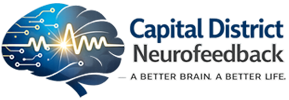First Direct Evidence of Neuroplastic Changes Following Brainwave Training
Date: (Wednesday, March 10, 2010) University of London researchers have found the “First Direct Evidence of Neuroplastic Changes Following Brainwave Training“. This is a major step forward in recognizing the signficant benefits that can be achieved through neurofeedback therapy. The researchers found that “[r]emarkably, these after-effects are comparable in magnitude to those observed following interventions... keep reading »
Aerobics For The Brain
Date: (Thursday, November 1, 2007) Chicago Tribune Article, edited; November 2007 After 20 years of anti-depressant drugs and therapy, Lisa Ferguson still struggled with anxiety, poor sleep and panic attacks. Then she met a doctor who suggested neurofeedback. Ferguson gave it a month, saw improvement and stuck with it. A recent article in the Chicago... keep reading »
Re-training the Brain: Using Neurofeedback to Help Individuals with Autism Spectrum Disorders
Date: (Monday, May 3, 2004) By Laurence M. Hirshberg, Ph.D. FYI: This article first appeared in the May-June 2004 issue of the Autism Asperger’s Digest, a 52-page bimonthly magazine on autism spectrum disorders published by Future Horizons, Inc. For more information, visit www.autismdigest.com. Evan’s mom was desperate; her son tantrummed ten to twenty times most... keep reading »
Neurofeedback treatment for attention-deficit/hyperactivity disorder in children: a comparison with methylphenidate
Date: (Friday, February 28, 2003) Appl Psychophysiol Biofeedback. 2003 Mar;28(1):1-12. Fuchs T, Birbaumer N, Lutzenberger W, Gruzelier JH, Kaiser J. Institute of Medical Psychology and Behavioral Neurobiology, Eberhard-Karls-University, Gartenstr. 29, 72074 Tubingen, Germany. Clinical trials have suggested that neurofeedback may be efficient in treating attention-deficit/hyperactivity disorder (ADHD). We compared the effects of a 3-month electroencephalographic... keep reading »
The effects of stimulant therapy, EEG biofeedback, and parenting style on the primary symptoms of attention-deficit/hyperactivity disorder
Date: (Saturday, November 30, 2002) Appl Psychophysiol Biofeedback. 2002 Dec;27(4):231-49. Monastra VJ, Monastra DM, George S. FPI Attention Disorders Clinic, Endicott, New York USA FYI: Note that many have ADD or ADHD. One hundred children, ages 6-19, who were diagnosed with attention-deficit/hyperactivity disorder (ADHD), either inattentive or combined types, participated in a study examining the... keep reading »
Are ADHD medications safe over the long term?
“What is Neurofeedback?”, Journal of Neurotherapy article.By Dr. Cory Hammond, a professor at University of Utah School of Medicine. A meta-analysis (Schachter, Pham, King, Langford, & Hoher, 2001) of randomized controlled studies of medication treatment for ADD/ADHD concluded that the studies were of poor quality, had a strong publication bias (meaning that drug company funded... keep reading »
Neurofeedback Helping Those With Autistic Disorders
Connectivity-Guided Neurofeedback for Autistic Spectrum Disorder; Biofeedback], 2007; Vol. 35(4):131-135 Research on autistic spectrum disorder (ASD) shows that neurofeedback (EEG biofeedback) can remediate anomalies in brain activation, leading to symptom reduction and functional improvement. This evidence raises the hopes for a behavioral, psychophysiological intervention moderating the severity of ASD. The research is reviewed in a... keep reading »
